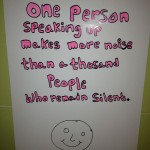My last post addressed some reasons why teachers may choose to close their doors. By this I mean that some (many?) otherwise highly effective teachers still function in that self-protective mode of outward compliance with policies and initiatives that they do not personally endorse, while within the walls of their classrooms they continue forward, prioritizing the things they consider to be most important and urgent with their own students.
How should teachers respond to situations in which policies and administrative practices are inconsistent with the teacher’s own philosophies and goals? Especially when the consequences of dissent or debate can feel punitive or even threatening to a teacher’s job security? Is the answer really closing the classroom door?
I don’t believe so.
Or let me rephrase that: I feel compelled to keep my door open. I’m not sure that I could close it if I tried. But even if I could, why would I?
As teachers, our voices are some of the few that can take a stand on behalf of students. We do not represent testing or test-prep corporations who profit on the backs of students and their achievement (or lack thereof); we do not sell products or supplies; and we spend the day with kids. We serve the interests of students. By closing our doors, although our voices may make their way beyond the school walls through broader professional networks, we silence ourselves in our local context. Although it can feel risky because our teaching contexts are more personal, dissatisfied teachers must use their voices within their schools and districts to create change. Learning how to do this effectively may take some work, but isn’t that an important part of our work?
More selfishly, if I were to close my doors I cut myself off to some of the richest resources on campus, my fellow teachers and support staff. How can I effectively partner with these folks if I am not willing to share the reality of what is happening in class? Where would my lesson plan ideas come from? Though I can google just about anything, there is nothing like starting out with the materials created by smart teachers who have taught the same population the same course in the in the same context using the same resources. Online course platforms like Canvas make it easier than ever to share and modify activities, assessments and materials. Closing my doors would mean reinventing the wheel. I also love developing my own projects, rubrics and activities and sharing them with others. My colleagues help me refine them.
In terms of community, it is important to maintain an open attitude in order to partner with parents and families for the good of students. What we do and why should not be any kind of secret. These days, if a student is in a period that is especially challenging management-wise, I often find myself sharing that information with the parent. These tidbits, I suppose, could come across as weakness to more adversarial parents, but I think it is worth providing a complete context for a student’s behavior or level of achievement. And parents can sometimes provide key information that help to turn things around for a particular student, or even an entire class.
In a broader sense, I believe that the nitty-gritty reality of classroom life is better NOT hidden behind a closed door. Policies, both local and broader, will not change to meet the needs of today’s classroom if teachers close their doors.
And, when all is said and done, if within a specific context a teacher does not feel safe enough to open her doors, then perhaps that teacher should in fact search for the exit.









Comments 2
You touch on a lot of different things in this post, but what stuck with me is the question of what a teacher should do when policies run counter to his or her philosophy or current practice. It can be a tough call no doubt, and I’m in favor of much more classroom autonomy than currently exists. But it always sounds weak to me when a teacher says something like, “They won’t let me do what’s best for kids.” I’ve heard too many unreflective and ineffective teachers say that as excuse to maintain their own entrenched practices. Plus, everyone says it to defend whatever policy or practice they’re promoting. I know this is kind of off your topic, but it reminded me of this gripe that I have.
No– I know! I totally get what you are saying. How to sort all of this out? I think we are all prone to seek evidence and reasoning to support what we already feel or believe. I am always questioning this about myself.